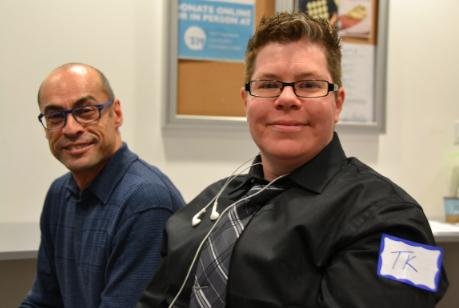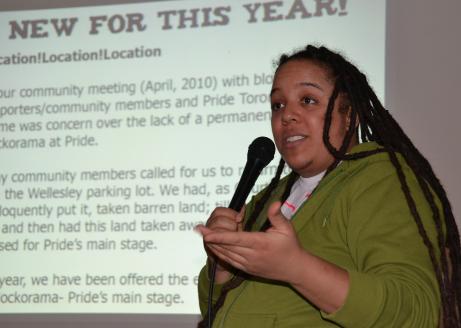
Pride Toronto co-chair Francisco Alvarez and arts and culture manager DJ TK. Credit: Andrea Houston
The room erupts in cheers when it’s announced that Blockorama is returning to the Wellesley Stage for Pride Week.
The announcement was made at the Blockorama Community Information Session at the 519 Church Street Community Centre on March 14.
Organizer Syrus Marcus Ware says the community just wants to see Blockorama get a permanent and prominent home.
“This was a huge issue last year. This is one those things that really frustrated people and they wanted some resolution around,” he says. “The big question was what is going to happen this year.
“Well, we have been offered the entire Wellesley parking lot this year, which is Pride’s main stage.”
Pride Toronto (PT) co-chair Francisco Alvarez says the Wellesley Stage, across from Wellesley Station, will “most likely” be the new permanent home for Blockorama.
The news came as a welcome surprise to many in the room, who cheered and clapped.
Blockorama is an all-day dance party celebrating black queer pride, traditionally held on the Sunday of Pride weekend. Its home from 1999 to 2005 was the parking lot across from Wellesley Station. But the event has been moved three times since 2006; in 2010, PT tried to move Blockorama again but backed down in the face of considerable protest.
The Wellesley Stage will be licensed, with a 4,000-person capacity and the Blockorama budget is up 20 percent, Ware says.
Meanwhile, Alvarez says PT will announce the members of the nine-member implementation committee on Feb 15. The committee will work to put in place the recommendations from the Community Advisory Panel (CAP) report.
“We’re still waiting on one person,” he says. “It’s a good group, made up of executive directors of LGBT organizations.”
Four members of the committee are known: Maura Lawless from The 519; Scott Ferguson, executive director of Inside Out; Glen Brown, former interim executive director at the AIDS Committee of Toronto (ACT); and Angela Robertson, director of equity and community engagement at Women’s College Hospital and chair of Black CAP.
Guided by the CAP recommendations, the implementation committee will “farm the work out” after reviewing the recommendations and setting priorities.
The focus will be on the search for a new executive director, Alvarez says. The position will be an interim contract, not a staff position. However, he says, there is a possibility the position could turn into something more permanent in the future.
“Right now we need someone to concentrate on financial management,” he says. “Down the road we may need a ‘visionary.’”
With a new focus on financial accountability, PT has asked for the help of TD Bank financial planner Thomas Gingras. Alvarez tells Xtra Gingras will produce a report by the end of the month.
“So much depends on whether or not funding comes through from the city,” he says. “If there’s no city funds, we have to figure out what we can’t do. The three must-haves are the parades. Everything else can potentially be affected by budget cuts.”
PT is meeting with the City of Toronto’s executive director of culture, Rita Davies, on March 21 for an update on the conditions of the grant, Alvarez says. “I think she’ll recommend the grant.”
Alvarez says PT is hoping for the best but preparing for the worst when city council votes on funding.
“The TCHC [Toronto Community Housing Corporation] scared a lot of people,” he adds. “Everyone’s thinking Pride is next.”
Some CAP recommendations are essential and will need to be folded into all levels of PT over the next few years, he says. “Something like ‘ceasing trans tokenism.’ That’s something we can never stop doing.”
Roy Mitchell, the PT board secretary, is busy putting together the dispute-resolution committee. Alvarez says Doug Elliott has provided a list of lawyers who may be interested in sitting on the committee. PT is also looking to include labour arbitrators and other “experts.”
“We would like to have a roster of people to call, rather than a committee,” Alvarez says.
The dispute-resolution committee will act as “an independent” council to rule on which groups can participate in the Pride parade and which can’t.
All groups scheduled to participate in the parade will be posted on PT’s website in two to three weeks, Alvarez says. Once the list is posted, members of the public will have 15 days to respond with a complaint, which will trigger the dispute-resolution process.
If either side is still unsatisfied with the decision after the committee rules, the complaint goes to an appeal process. Alvarez says that decision on appeal will be final.
“That will be the final decision on QuAIA (Queers Against Israeli Apartheid),” he says. “The whole point of the [dispute-resolution committee] is so PT does not have to make a decision on QuAIA.”
At the Trans Pride community meeting on March 10, Alvarez officially threw PT’s support behind Bill C-389, which would give trans Canadians explicit protection under the law. The bill has made it through the House of Commons but is now facing a long fight in the Senate.
Alvarez told the group the PT board decided unanimously to officially urge the Senate of Canada to support and pass the bill as quickly as possible.
Alvarez handed out a copy of the letter addressed to all senators of Canada. “With a federal election on the horizon, it is imperative that this very important bill not be allowed to die,” he says.
“This was recommended resoundingly from the CAP, but it’s also something Pride should be doing,” Alvarez tells Xtra.

 Why you can trust Xtra
Why you can trust Xtra


